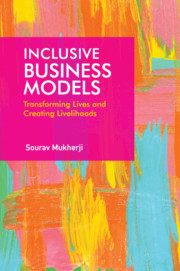Book contents
- Frontmatter
- Dedication
- Contents
- List of Tables
- List of Figures
- Preface
- Acknowledgements
- 1 Introduction
- 2 Vaatsalya Hospitals: Affordable Healthcare in Proximity
- 3 Gyan Shala: Providing Inclusive Education
- 4 Rang De: Creating a Platform for Social Investing
- 5 Labournet: Empowering Informal Sector Labourers
- 6 Selco: Inclusive Model for Energy Access
- 7 Hasiru Dala Innovations: Improving Lives of Waste Pickers
- 8 Reliance Retail: Creating Inclusive Supply Chain
- 9 International Development Enterprise (Ide) Nepal: Developing Smallholder Ecosystem
- 10 Ruralshores: Delivering Inclusive Service
- 11 Gujarat Narmada Fertilizer Company’s (Gnfc) Neem Initiative: A Social Business
- 12 Bringing it All Together
- References
- Index
2 - Vaatsalya Hospitals: Affordable Healthcare in Proximity
Published online by Cambridge University Press: 31 July 2021
- Frontmatter
- Dedication
- Contents
- List of Tables
- List of Figures
- Preface
- Acknowledgements
- 1 Introduction
- 2 Vaatsalya Hospitals: Affordable Healthcare in Proximity
- 3 Gyan Shala: Providing Inclusive Education
- 4 Rang De: Creating a Platform for Social Investing
- 5 Labournet: Empowering Informal Sector Labourers
- 6 Selco: Inclusive Model for Energy Access
- 7 Hasiru Dala Innovations: Improving Lives of Waste Pickers
- 8 Reliance Retail: Creating Inclusive Supply Chain
- 9 International Development Enterprise (Ide) Nepal: Developing Smallholder Ecosystem
- 10 Ruralshores: Delivering Inclusive Service
- 11 Gujarat Narmada Fertilizer Company’s (Gnfc) Neem Initiative: A Social Business
- 12 Bringing it All Together
- References
- Index
Summary
This case describes the evolution of Vaatsalya Hospitals – a network of hospitals, set up in small towns and cities in the southern Indian state of Karnataka. In India, good quality healthcare services are mostly provided by private hospitals that are located in large cities and focus on tertiary care. Nearly 800 million Indians living in semi-urban and rural India have little or no access to high quality healthcare services at affordable prices. Vaatsalya was founded by two doctors, Dr Ashwin Naik and Dr Veerendra Hiremath, in 2004 to fill this gap. They decided to provide good quality primary and secondary healthcare to semi-urban and rural India by setting up a network of low-frills and low-price hospitals. In their four-and-a-half years of operation, Vaatsalya established nine hospitals across seven districts in Karnataka, created a capacity of more than 450 beds and treated close to 175,000 patients, making it the largest chain of its kind. The case describes the various challenges that Vaatsalya faced and the different ways in which it overcame them in the process of establishing a financially sustainable business model.
STATE OF HEALTHCARE IN INDIA
The inadequacies of the Indian healthcare system cause 1 million Indians to die every year and leave 700 million without any access to specialized care. While more than three quarters of the Indian population lives in villages and small towns, 80 per cent of specialist doctors are located in urban areas. As a result, patients from semi-urban and rural India are forced to choose, more often than not, between the local unqualified practitioner and the free treatment provided at the nearest government-run hospitals that are characterized by poor quality equipment, unhygienic conditions and perennial absence of appointed doctors and hospital staff. A survey of government-run healthcare centres revealed that there was a high rate of absenteeism among doctors (43 per cent), nurses (40 per cent) and pharmacists (30 per cent) (Muralidharan, Chaudhury and Hammer 2011). Likewise, researchers found the infrastructure in Indian healthcare facilities to be more deficient than that of many countries in sub-Saharan Africa, which are poorer than India (Bajpai 2014).
As and when patients realize that neither of these two options – the local quack or the government hospital – is going to provide them with the necessary cure, they undertake long journeys to reach hospitals in big cities.
- Type
- Chapter
- Information
- Inclusive Business ModelsTransforming Lives and Creating Livelihoods, pp. 15 - 47Publisher: Cambridge University PressPrint publication year: 2021

